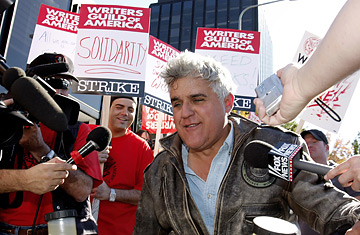
The Tonight Show talk show host Jay Leno greets supporters of the Writers Guild of America (WGA) and others on the picket line in front of Universal Studios in Universal City, Calif.
How long can late-night TV addicts live without Jon Stewart's political gibes and David Letterman's Top 10 lists? More important, how long can the hosts of these strike-silenced shows hold out against the pressure to go back on the air, with or without their writers? That's the agonizing question facing the late-night talk shows as the strike by the Writers Guild of America nears the end of its second week.
All of the late-night shows — from Letterman and Jay Leno to the twin terrors of Comedy Central, Jon Stewart and Stephen Colbert — have gone into reruns since the strike began on Nov. 5. But the ethical dilemma confronting the hosts is a keen one. As members of the Writers Guild themselves, do they support their union and refuse to do their shows until the strike is settled? Or go back on the air without their writers — and thus avoid having to lay off dozens of staff members who depend on them for a weekly paycheck and benefits?
Intense discussions are currently under way at NBC, which wants to lay off the staffs of both the Tonight show and Late Night With Conan O'Brien by the end of the week, according to network insiders. An NBC spokesman wouldn't comment, except to say that the shows are in reruns until further notice and that the staffs have been told that layoffs are a definite possibility.
At CBS, meanwhile, staffers at the Late Show With David Letterman and Late Late Show With Craig Ferguson are breathing a sigh of relief after Letterman assured them this week that they would get paid at least through the end of the year, whether or not the shows resume production. Letterman was able to make that promise because both shows are owned by his production company, Worldwide Pants — unlike Tonight and Late Night With Conan O'Brien, which are owned by NBC.
The late-night landscape has changed a lot since 1988 — when the writers last went on strike, and both Johnny Carson and Letterman eventually went back on the air, without writers, before the five-month strike was finally settled. Then there were just two late-night comedy-talk shows. Today there are more than half a dozen, competing fiercely with each other — not to mention with a host of other cable and Internet viewing options. The longer these shows stick with reruns, the more they risk losing their audience for good. At the same time, the shows are more heavily dependent on scripted material than ever — particularly Stewart's Daily Show and The Colbert Report, which would seem all but impossible to resume without writers.
Privately, insiders say that some of the hosts would be ready to go back on the air without writers — focusing more on guests and ad-libbed material — but are leery of the consequences. "My sense is that all the hosts would like to come back, but nobody wants to be first," says one late-night producer. They cannot have been encouraged by the experience of Ellen DeGeneres, who drew sharp criticism from the Writers Guild when she resumed her daytime talk show just one day after the strike began — and this week had to cancel a scheduled taping in New York after threats that her show would be picketed.
Yet the hosts who have held out for longer might get a pass from the strikers. Letterman's gesture of support for his staff this week, for example, appears to have won him a lot of goodwill. Bill Scheft, a striking Late Show writer, says that "we would have no problem" if Letterman were to go back on the air without writers. "We are thrilled that he is standing with us," says Scheft. "David Letterman on the air without writers, pissed off and talking about the strike, would be the greatest ally the writers could have."
Yet for these hosts, deciding whether to go back on the air involves a delicate balance of public image and private ego. Leno, for instance, has been the most vocal supporter of the union — even bringing doughnuts to the picketers on the first day of the strike — and would seem the least likely to reverse course and go back on the air. Yet Leno also seems more closely tied to his scripted material and might be less able to smoothly transition into an unscripted show than hosts who are more natural ad-libbers, like Letterman and O'Brien.
Then there's the crucial question of whether a host, as a Writers Guild member, would even be allowed to write material for himself on his own show. A Writers Guild spokesman told TIME that the hosts (who are also members of AFTRA, the union representing performers) are free to perform on their shows, but not to write material for themselves. Of course, the question of whether a wisecrack that Conan or Dave thinks up in advance should be regarded as written material or an ad-lib could be the subject of unending philosophical debate.
Or maybe a Letterman monologue.
With reporting by Elisabeth Salemme and Lina Lofaro